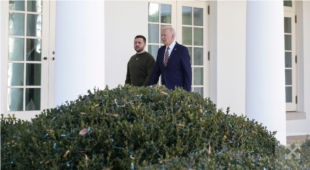Ukraine’s support precariously dependent on fickle democracies?
The week’s events have made it clear how vulnerable Ukraine’s international alliance is to internal national politics and the democratic calendar. This is especially true when it comes to Poland and the USA. It is reported by Upmp.news with reference to “Polskie Radio”.
Poland’s upcoming elections have led the ruling Law and Justice Party to increase nationalist elements in their rhetoric in a bid to capture some of the far-right Konfederacja electorate. This has in turn led to disputes with Ukraine over grain exports and a war of words between the previously close allies.
For its part, the United States is going through a government shutdown, so the US Treasury is blocked from making payments to Ukraine. Fortunately for Ukraine, the Pentagon was able to get around the shutdown, delivering much-needed ammunition that had been confiscated en route from Iran to Yemen. The delivery is not subject to the shutdown.
The US is already in the runup to Republican primaries where the presidential candidate will be chosen. The primary elections will take place in spring and summer 2024, with the presidential election on November 5th 2024.
One of the most important parts of this runup are televised debates between the candidates where they have been setting out their policy differences, including on Ukraine. Here there is a sharp divide that has opened up in the Republican party between those supporting continued military and financial support for Ukraine and those following the [quote] “splendid isolation” policies of several leading republicans of the past and present, including the latest, Trumpian and more nationalist, incarnation of “America First”. A popular phrase of this tradition, more liberal in its tone, has been to say that [quote] “America is not the policeman of the world”.
However unclear their exact strategies are, three republican candidates would definitely reduce US support for Ukraine: Donald Trump, Ron DeSantis and Vivek Ramaswamy. (This New York Times article summarises the policy positions of the Republican candidates.)
Donald Trump in his first term in office espoused a perhaps unprecedented combination of reluctance to enter military conflicts (his underreported “pacifism”) with open – even personal and affectionate – admiration for highly authoritarian leaders like Vladimir Putin and Chinese communist leader Xi Jinping. This tendency of Trump was so noted it led CNN to publish an article in 2019, “15 times Donald Trump praised authoritarian rulers”
Out of the three Republican candidates who would reduce support for Ukraine, the newcomer Vivek Ramaswamy has gone the furthest, stating he would ask Ukraine to sacrifice territory to reach a peace agreement. He places this policy in the context of his argument that current US policy is driving Russia and China into a close and dangerous alliance. However, Ramaswamy’s stance is highly controversial in the US itself, as evidence by the following incident:
While it remains the case that the majority of the Republican candidates remain pro-Ukraine, out of the front-runners only Nikki Haley and Chris Christie have expressed strong commitments to continued support for Ukraine.
Sources: New York Times, CNN, Twitter
pt

